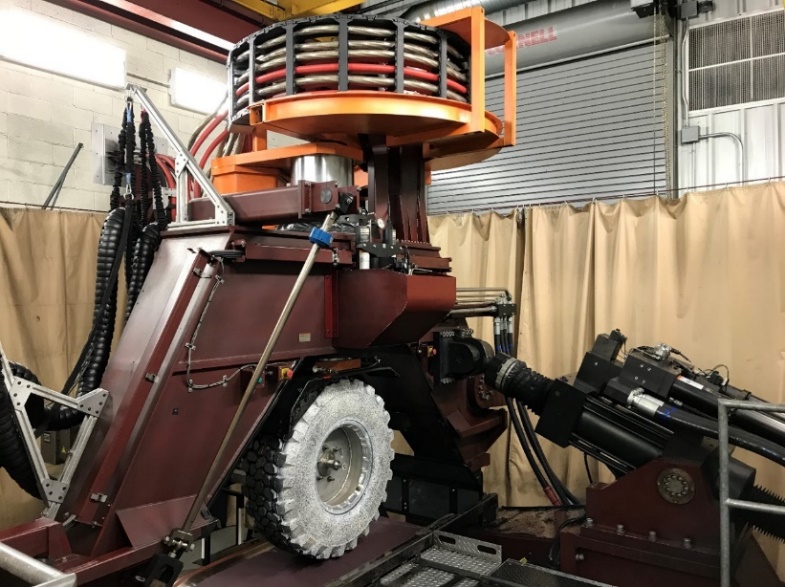Advanced Structures & Materials
Annual PlanA Tire-Soil Interaction Representation for Agile Tire Slippage Characterization and Detection
Project Team
Principal Investigator
Vladimir Vantsevich, Worcester Polytechnic Institute Lee Moradi, Worcester Polytechnic InstituteGovernment
Yeefeng Ruan, Vamshi Korivi, U.S. Army GVSC
Faculty
Samuel Misko, UAB
Industry
Thomas Canada, Southern Company Services, Inc.
Xiaobo Yang, Oshkosh Corporation
Student
Jordan Whitson, Moataz Khalifa (postdoc), UAB
Project Summary
Project began November 2019 and was completed end-2022.

A drawback of modern ground vehicle electronic control systems such as traction control systems (TCS), torque vectoring systems, etc. is that they possess a control response time within 100 to 120 milliseconds and greater. This means that the actual control of a spinning wheel occurs after the wheel is losing or has lost the grip with terrain and the vehicle can be very likely immobilized.
Recently launched agile tire dynamics challenges existing vehicle control systems in terms of their response time to dynamic changes of road and terrain conditions for providing an effective real-time actuation, i.e., for ensuring sustainable terrain mobility. The approach is to reduce the response time of control systems to the tire longitudinal relaxation time constant and, thus, to establish the time boundaries for controlling the drive wheel within a certain interval.
The project is aimed at conducting the basic research to uniquely define parameters (‘cause’) which are measurable in real-time and which lead to tire slippage (‘effect’). The proposed work belongs to the (i) terramechanics area of detecting dynamic changes in the tire-soil interaction, and (ii) in-tire sensing for its use in AI-based algorithm design for autonomous vehicle control.
The ultimate goal of this project is to develop the detailed knowledge necessary for deploying autonomous systems for vehicle directional control (VDC). Generally, a basic requirement for an autonomous system is that both the ‘cause’ and the ‘effect’ be stated as sets of parameters, which uniquely quantify them and are measurable by sensors. The application of Deep Learning technology is then used to identify the specific combinations of values of ‘cause’ parameters that lead to unacceptable ‘effect’ and then to define the control actions necessary to bring the system to acceptable operation. This knowledge (or Artificial Intelligence) stored in onboard computers continuously monitors the system and takes the necessary actions autonomously. Depending on the specific Deep Learning algorithms and the computation power available, the autonomous control system will continuously ‘learn’ and can account for new or unforeseen conditions.
Prior Work and References:
- Gray, J. P., Vantsevich, V. V., & Paldan, J., 2016. Agile tire slippage dynamics for radical enhancement of vehicle mobility. Journal of Terramechanics, 65, 14-37.
- Vantsevich V. V., Agile Dynamics Fundamentals for Tire Slippage Modeling and Control. ASME DETC2014-34464, August 17-20, Buffalo, NY, 2014.
- V. V. Vantsevich, L. Demkiv, S. Klos, Analysis of Tire Relaxation Constants for Modeling Vehicle Traction Performance and Handling, ASME 2018 Dynamic Systems and Control Conference.
- V. V. Vantsevich, L. Demkiv, S. Klos, S. Misko, L. Moradi, An Experimental study of Longitudinal Tire Relaxation Constants for Vehicle Traction Dynamics Modeling, ASME 2019 Dynamic Systems and Control Conference.
#3.A66/3.16/3.A84
Publications:
J. Paldan, V. V. Vantsevich, D. Gorsich, M. Letherwood, “4x4 Hybrid Electric Vehicle vs. Fully Electric Vehicle (FEV) Mobility in Drastically Changing Terrain Conditions”, 3rd, International Conference, IFToMM Italy, September 9-11, 2020
M. Ghasemi, V. V. Vantsevich, D. Gorsich, J. Goryca, A. Singh, L. Moradi, Physics Based Single-Wheel Module Slippage Assessment For Autonomous Control Design , Ground Vehicle Systems Engineering and Technology Symposium (GVSETS) & Advanced Planning Briefings for Industry (APBI), August 12-12, 2021.
J. A. Whitson, J.R. Paldan, V. V. Vantsevich, D. J. Gorsich, M. D. Letherwood, A Split Tire-Soil Traction Model for Analysis of Tire Characteristic Slippage and Tire Database, Proceedings of the ISTVS 20th International Conference, Montréal, Québec, Canada, September 2020/2021.

